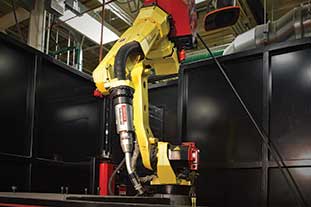New labs, programs for web of mobility
Thanks to a $4.4 million grant from the Michigan Community College Skilled Trades Equipment Program, the Washtenaw Community College Division of Advanced Technologies and Public Service Careers has had a major transformation of its labs and programs.
This transformation is helping create the workforce of the future and increasing the skills and knowledge of the current one, notably in advanced transportation, a discipline that combines advanced manufacturing and information technology in public transport, road traffic, transport networks and air transport.
“Transportation is clustering with the automotive and information technology industries. That’s why we created the Advanced Transportation Center, to help bring these three areas together,” said Al Lecz, the center’s director. “There are skills and competencies developing in these areas that we are now teaching at WCC.” “There are skills and competencies developing in these areas that we are now teaching at WCC.” Al Lecz, ATC Director Advanced Technology and Transportation Careers New labs, programs for web of mobility wccnet.edu LAUNCH 9 The future starts today. One day, every city will be a “Smart City” with a connection between all transportation infrastructures. Vehicles will send and receive communication from traffic devices, making travel routes faster, safer and more efficient. Cars, light-duty and commercial trucks, busses, trains and planes will operate as parts of an intricate web of wireless technology. The establishment of the WCC Advanced Transportation Center will support the training of the future workforce and the enhancement of the current one’s skills! Learn more at wccnet.edu/atc
The college has also updated, expanded and replaced its existing certificate programs to meet the current and projected needs of area employers in regards to the surging need for advanced transportation expertise.
The WCC formula
“The WCC formula for advanced transportation contains intelligent transportation, auto services and functions and advanced manufacturing,” Lecz explained.
To create that formula, WCC has credit and noncredit classes to train future employees and increase the value of the incumbent workforce as they amass their up-to-date technology skills and knowledge.
Programs include:
- Applied data science, where students learn how to capture, manipulate and analyze structured data, the massive volume of numeric values that can be stored and sorted. They learn how to transform data into information to enable faster and more intelligent decision-making.
- Automotive testing, where students receive an introduction to the test and data acquisition processes in automotive testing. Students also learn how to assemble and disassemble components for automotive testing.
- IT programs that provide a variety of programming, security and networking pathways that prepare students for careers that leverage the automobile as a device that is able to send and receive data.
- Powertrain development, where students develop the knowledge and skills to perform in-car powertrain testing in unique testing environments.
- Supply chain management, where students prepare to effectively perform in a supply chain setting and to take the tests needed to receive Logistics Associate and Certified Logistics Technician industry certifications.
“Our faculty has been teaching the latest techniques, but on older equipment or in theory,” Lecz said. “For these programs, it was extremely important that we upgrade our labs.”
With the rapid speed the technology in these fields is developing, transportation and manufacturing professionals need to stay compliant, up-to-date and innovative. And that’s something WCC is well equipped to deliver.
“It’s a very exciting time,” remarked Lecz. “Smart cities and smart highways are being created right now. And those will help drivers and vehicles see and respond to construction, road conditions and accidents.”
The future starts today. One day, every city will be a “Smart City” with a connection between all transportation infrastructures. Vehicles will send and receive communication from traffic devices, making travel routes faster, safer and more efficient. Cars, light-duty and commercial trucks, busses, trains and planes will operate as parts of an intricate web of wireless technology. The establishment of the WCC Advanced Transportation Center will support the training of the future workforce and the enhancement of the current one’s skills!
Learn more at wccnet.edu/atc